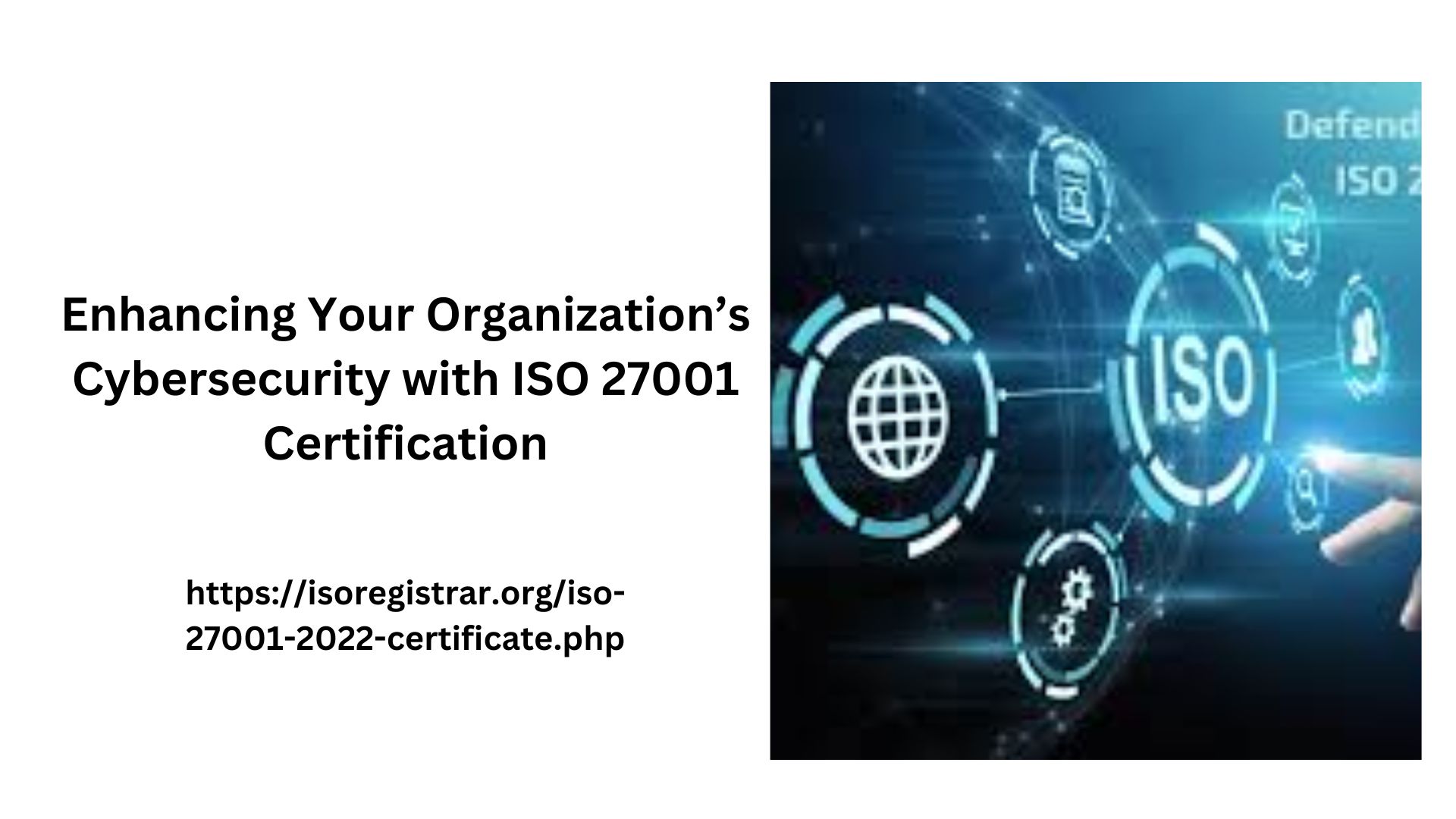Enhancing Your Organization’s Cybersecurity with ISO 27001 Certification

In an era where cyber threats are becoming increasingly sophisticated and widespread, organizations must prioritize cybersecurity to safeguard sensitive information, maintain operational continuity, and protect their reputation. As businesses store more data, rely on digital systems, and interact with customers online, the importance of robust cybersecurity practices has never been greater.
One of the most effective ways to enhance cybersecurity and demonstrate a commitment to securing information is by achieving ISO 27001 certification. ISO 27001 is an internationally recognized standard for information security management that helps organizations protect their data and systems through a structured approach to risk management, security controls, and continuous improvement.
This guide will explore how ISO 27001 can enhance your organization's cybersecurity posture, the key benefits it offers, and the steps involved in obtaining certification.
Understanding ISO 27001?
ISO 27001 is a part of the ISO/IEC 27000 family of standards, which provides a comprehensive framework for information security management. The primary objective of ISO 27001 is to help organizations establish, implement, maintain, and continuously improve an Information Security Management System (ISMS).
The ISMS is designed to identify security risks, protect sensitive data, and mitigate potential threats across all areas of an organization’s operations. By adhering to the ISO 27001 standard, organizations can ensure that their cybersecurity measures are comprehensive, systematic, and in alignment with international best practices.
How ISO 27001 Enhances Cybersecurity
Systematic Risk Management
One of the key principles of ISO 27001 is risk management. By adopting ISO 27001, organizations systematically identify, assess, and manage information security risks. This proactive approach enables businesses to anticipate potential threats—such as data breaches, cyberattacks, or insider threats—and take appropriate actions to reduce their likelihood and impact.
Comprehensive Information Security Controls
ISO 27001 provides a set of security controls, known as Annex A controls, that cover a wide range of cybersecurity aspects, including access control, data encryption, physical security, incident response, and more. These controls are designed to safeguard information in all its forms—whether digital, physical, or intellectual.
By adopting these controls, organizations ensure that their cybersecurity framework is robust and comprehensive. For example:
Access controls ensure that only authorized personnel have access to sensitive data and systems.
Cryptography protects data during transmission or storage to prevent unauthorized access.
Physical security measures protect facilities from unauthorized access or damage.
Improved Incident Management and Response
An essential element of ISO 27001 is the ability to detect, respond to, and recover from security incidents. By adhering to ISO 27001, organizations establish clear procedures for handling cybersecurity incidents, such as data breaches or malware infections.
The incident response plan defines roles and responsibilities, escalation procedures, communication protocols, and recovery strategies. This ensures that when a cybersecurity event occurs, the organization can react quickly, minimize damage, and recover operations swiftly.
Business Continuity and Resilience
Cyberattacks or data breaches can disrupt business operations and lead to significant downtime. ISO 27001 helps businesses ensure that cybersecurity is integrated with broader business continuity planning.
The standard emphasizes the importance of identifying critical business functions, ensuring that backup systems are in place, and creating recovery plans. By aligning cybersecurity efforts with business continuity, ISO 27001 helps organizations build resilience, ensuring they can continue operations even during a cyber incident.
Regulatory Compliance
In addition to improving internal cybersecurity measures, ISO 27001 helps businesses comply with various legal and regulatory requirements regarding data protection. For example, organizations that handle personal data must comply with the General Data Protection Regulation (GDPR) in the European Union or the Health Insurance Portability and Accountability Act (HIPAA) in the United States.
Benefits of ISO 27001 Certification for Cybersecurity
Building Trust and Reputation
One of the most immediate benefits of achieving ISO 27001 certification is the boost it gives to your organization’s reputation. In a digital-first world, customers and business partners are increasingly concerned about how their data is handled and protected. Achieving ISO 27001 certification signals to customers that your organization has taken the necessary steps to protect their sensitive information and reduce the risk of a data breach.
Increased Cybersecurity Awareness Across the Organization
Implementing ISO 27001 certification is not just about meeting a set of security standards—it’s also about fostering a security-conscious culture throughout the organization. ISO 27001 requires regular training and awareness programs for employees, ensuring that everyone in the organization understands their role in maintaining cybersecurity.
Ongoing Improvement of Cybersecurity Measures
ISO 27001 promotes continuous improvement through regular audits, reviews, and updates. The standard requires organizations to monitor the effectiveness of their security measures and adjust them in response to new threats or vulnerabilities.
This continuous improvement cycle ensures that an organization’s cybersecurity measures remain relevant and robust, even as the threat landscape evolves.
Risk Reduction and Business Protection
ISO 27001 helps organizations minimize the risks associated with data breaches, system failures, and cyberattacks. By identifying and mitigating security risks, businesses can reduce the likelihood of incidents that could lead to financial losses, damage to reputation, or legal liabilities.
Cost Savings
By proactively identifying and managing cybersecurity risks, ISO 27001 can help organizations save money in the long run. Preventing security breaches, compliance violations, and downtime associated with cyber incidents can result in significant cost savings. Furthermore, effective cybersecurity practices can lead to reduced insurance premiums and lower legal or regulatory costs related to data breaches.
Note: Apply for ISO 9001 certification - Quality management system
Conclusion
ISO 27001 certification provides organizations with a comprehensive, systematic framework to enhance their cybersecurity posture. By implementing ISO 27001, businesses can identify and mitigate risks, establish robust security controls, and create a culture of continuous improvement that strengthens their defenses against cyber threats.
Achieving ISO 27001 certification not only improves an organization’s cybersecurity but also builds trust with customers, ensures regulatory compliance, and helps protect the business from the financial and reputational damage caused by security breaches. As the cyber threat landscape continues to evolve, ISO 27001 offers organizations the tools they need to stay secure and resilient in a digital world.
Note: IndiBlogHub features both user-submitted and editorial content. We do not verify third-party contributions. Read our Disclaimer and Privacy Policyfor details.






